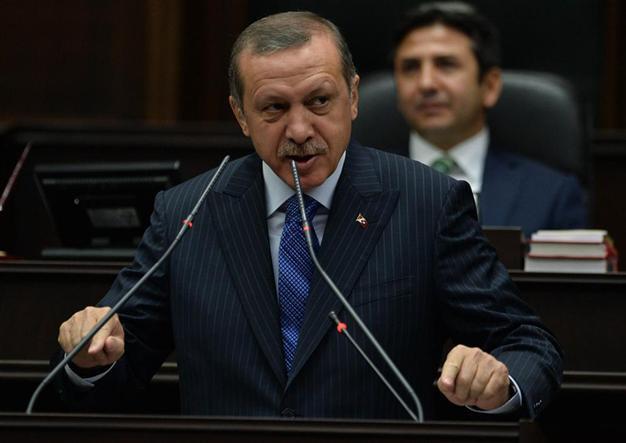Egypt coup provokes political row in Turkey
ANKARA

Prime Minister Erdoğan speaks during a parliamentary group address to his ruling Justice and Development Party (AKP). DAILY NEWS photo, Selahattin SÖNMEZ
Prime Minister Recep Tayyip Erdoğan has defended the correctness of the government’s regional policy, particularly on Egypt, even as the opposition has excoriated the administration for sparking fights with an ever-increasing number of neighbors.
Opposition figures claim the government is insisting on an imprudent regional policy that has ensured the country now has no ambassador in three important neighbors: Israel, Syria and Egypt.
Prime Minister Erdoğan refused to sound any notes of contrition yesterday, repeating his criticism of the overthrow of Egyptian President Mohamed Morsi.
“Our criticism of this coup, as Turkey, and our support for our Egyptian siblings have naturally annoyed the coup rulers in a serious way,” he said, addressing a parliamentary group meeting of his ruling Justice and Development Party (AKP).
Cairo said Nov. 23 it was expelling Turkish Ambassador Hüseyin Avni Botsalı and accused Ankara of backing organizations bent on undermining the country – an apparent reference to the Muslim Brotherhood of Morsi.
Erdoğan issued a blunt rebuttal to Egypt’s army-backed rulers, declaring on live television: “I will never respect those who come to power through military coups.”
He spoke shortly after Ankara had retaliated against the Egyptian move by declaring the Egyptian ambassador, currently out of the country, as persona non grata.
The cruel regime in Egypt is temporary, but Turkey’s tie with people of Egypt is permanent, Erdoğan said.
“We will not give up telling the truth because the coup administration in Egypt is annoyed and will not give up standing next to the Egyptian people,” Erdoğan said. “Do not forget, we will not be of those mute evils,” he added, using a description which he usually uses for Syrian President Bashar al-Assad.
Meanwhile, in welcoming landmark rapprochement between Western powers and neighboring Iran over the latter’s controversial nuclear program, Erdoğan referred to the Tehran Declaration of 2010 and suggested that the deal in Geneva had proved Turkey’s policy right.
The declaration was signed by the foreign ministers of Iran, Brazil and Turkey in a bid to form a basis for a comprehensive agreement over Iran’s nuclear standoff.
Erdoğan recalled how Brazil and Turkey objected to more sanctions against Iran at the time. Within two months of the signing of the declaration, in June 2010, twelve of the 15 nations on the U.N. Security Council voted for the sanctions, while Turkey and Brazil, two non-permanent members, voted against it, while Lebanon abstained.
Rather than foreign countries, opposition parties in Turkey criticized the country’s move at the U.N. Security Council, Erdoğan said. “They said ‘Turkey is pushed towards loneliness, Turkey’s axis is shifting, Turkey is in the same picture as Iran.’ Turkey’s justness has been revealed through the outcome in Geneva and Turkey’s thesis has been acknowledged. You will see, time will show our righteousness on Syria and Egypt, too, God willing, as has happened on the Iran issue.”
Attacks on ‘Strategic Depth’But both main opposition Republican People’s Party (CHP) leader Kemal Kılıçdaroğlu and Nationalist Movement Party (MHP) Devlet Bahçeli criticized Ankara’s ever-narrower foreign policy.
Also addressing his party’s parliamentary group, Kılıçdaroğlu said he was among the first to declare his objection to the coup in Egypt.
“Afterwards I added: ‘If you consign the foreign affairs to the man who wrote so-called ‘Strategic Depth,’ then no healthy view will be formed. [The government] has declared Egypt an enemy. They almost declared the Egyptian people an enemy, too,” Kılıçdaroğlu said, referring to a book written by academic-turned-Foreign Minister Ahmet Davutoğlu. The book, “Strategic Depth,” was published in 2001 and has been the backbone of the AKP’s foreign policy since it came to power in 2002.
In a response to a motion by CHP deputy Sezgin Tanrıkulu, Davutoğlu suggested that the bilateral relations between Turkey and Egypt were based on a “strong legal ground.” The response was dated Nov. 14, only days before Egypt expelled Turkey’s ambassador, the CHP leader said.
No envoy in Syria, Israel, EgyptLikewise, Bahçeli also noted that Egypt had been added to two key Middle Eastern countries, Syria and Israel, where Turkey has no ambassador.
According to Bahçeli, Erdoğan’s “admiration for Morsi, his consolation with the [four-fingered] Rabia sign and his attempt to intervene in Egypt’s internal affairs have led to additional burdens for Turkey.”
While again noting his objection to the coup in the North Africa country, Bahçeli said: “Although opposing and criticizing coups and defending democracy are [essential], both morally and in regards to humanitarian values, taking sides between the political actors of Egypt shows a lack of reason and discretion.”
